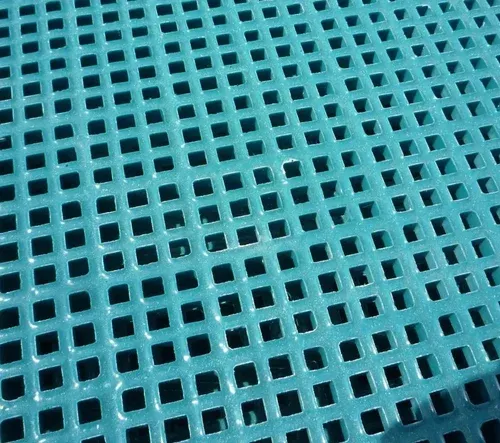loading...
- No. 9, Xingyuan South Street, Dongwaihuan Road, Zaoqiang County, Hengshui, Hebei, China
- admin@zjcomposites.com
- +86 15097380338
- Welcome to visit our website!
Choosing the Right Grating for Your Swimming Pool Design and Safety Needs
Understanding Swimming Pool Grating Importance, Types, and Maintenance
Swimming pools are a wonderful addition to any leisure space, offering a refreshing way to relax and exercise. However, maintaining safety and functionality in pool environments is paramount. One critical component often overlooked is swimming pool grating. This article explores the importance of pool grating, the various types available, and essential maintenance practices to ensure safety and longevity.
The Importance of Swimming Pool Grating
Swimming pool grating plays a crucial role in the overall safety and functionality of a swimming pool. It primarily serves two purposes preventing debris from entering the pool's drainage system and ensuring that water circulates efficiently, which is vital for maintaining clean and safe water.
1. Safety Pool grating is designed to minimize the risk of accidents. Without proper grating, there is a risk of swimmers tripping or getting stuck in the pool's drainage openings. Modern grates are designed with safety features such as slip-resistant surfaces and smooth edges to further reduce potential injuries.
2. Water Circulation Effective water drainage is essential in any swimming pool. Grates help direct water into the pool's filtration system, ensuring contaminants and debris are removed efficiently. This process is vital for maintaining water clarity and hygiene, preventing any possible health risks associated with stagnant or contaminated water.
3. Aesthetic Appeal Beyond functionality and safety, swimming pool grating contributes to the overall aesthetics of a pool area. Available in various materials, colors, and designs, grates can enhance the visual appeal of a pool, allowing homeowners and pool designers to create a captivating atmosphere.
Types of Pool Grating
When it comes to choosing the right grating for a swimming pool, there are several options available, each with its advantages and disadvantages.
1. Plastic Grating Often made from durable polymers, plastic grating is popular due to its lightweight nature and resistance to corrosion. It is typically available in various colors and can blend well with the pool’s design. However, while cost-effective, plastic grating might not be as sturdy as other materials.
2. Metal Grating Commonly made from stainless steel or aluminum, metal grates are highly durable and resistant to rust, making them ideal for long-term use in pool environments. They provide a sleek, modern look but can become hot under direct sunlight and may require additional maintenance to prevent corrosion.
swimming pool grating

3. Composite Grating This type combines plastic and wood fibers, offering durability and aesthetic appeal. Composite grating is resistant to fading and cracking and provides a warmer touch than metal grates. However, it usually comes at a higher price point.
4. Concrete Grating For a more permanent solution, concrete grates are sometimes used, especially in commercial settings. While robust and highly durable, they can be challenging to install and may not provide the same level of safety against slipping as other materials.
Maintenance of Pool Grating
To ensure the longevity and functionality of swimming pool grating, regular maintenance is required. Here are some key maintenance practices
1. Regular Cleaning Debris, leaves, and other materials can accumulate on pool grating, leading to blockages and inefficient drainage. Regularly sweeping and rinsing the grates will help promote optimal flow.
2. Inspect for Damage Over time, pool grating can become worn, cracked, or corroded. Regular inspections will help spot issues before they become serious problems, ensuring safety for all swimmers.
3. Chemical Resistance If the pool uses specific chemicals for sanitation, ensure the grating material is compatible. Certain chemicals can degrade plastics and metals over time, leading to premature failure.
4. Professional Evaluation If unsure about the condition of the grating or the necessary maintenance steps, consider consulting a professional. They can provide insights into the best practices for upkeep and recommend replacements if necessary.
Conclusion
Swimming pool grating is an essential component of any pool system, maximizing safety, efficiency, and aesthetics. By understanding the importance, types, and proper maintenance of pool grating, pool owners can ensure a safe, enjoyable swimming experience for all. Investing in the right grating and committing to regular maintenance will go a long way in enhancing the overall functionality and enjoyment of swimming pools.
-
GRP Structures: The Future of Lightweight, High-Performance EngineeringNewsJun.20,2025
-
FRP Water Tank: High-Performance Storage for Corrosive and Clean Water SystemsNewsJun.20,2025
-
FRP Square Tube: The New Industry Standard for Chemical and Structural ApplicationsNewsJun.20,2025
-
FRP Pultruded Profiles: The Ultimate Choice for Lightweight Structural StrengthNewsJun.20,2025
-
FRP Handrails: The Safer, Smarter, and Stronger Choice for Modern InfrastructureNewsJun.20,2025
-
FRP Grating: The Smart Solution for Durable, Lightweight Industrial FlooringNewsJun.20,2025
-
Why Choose a Galvanized Water Tank for Your Storage NeedsNewsMay.21,2025
